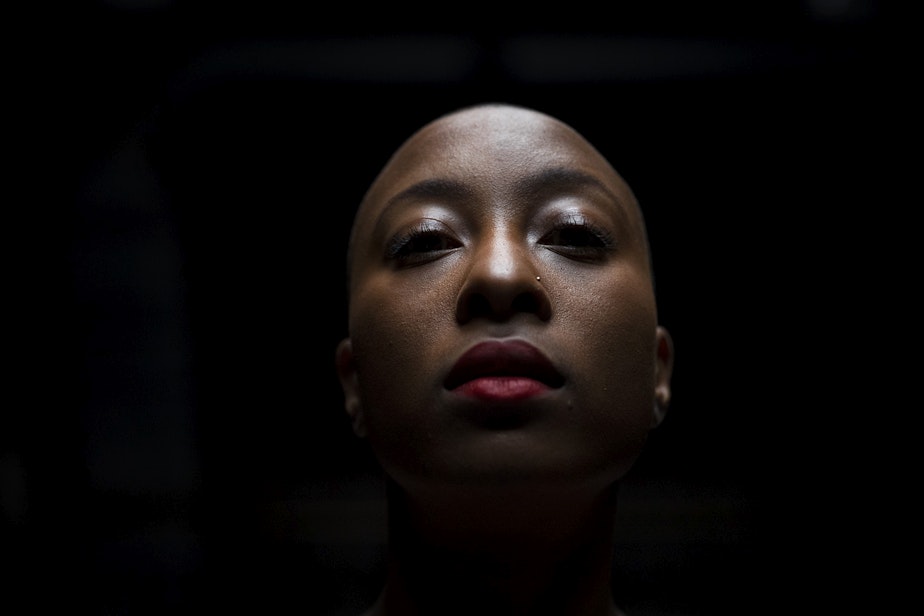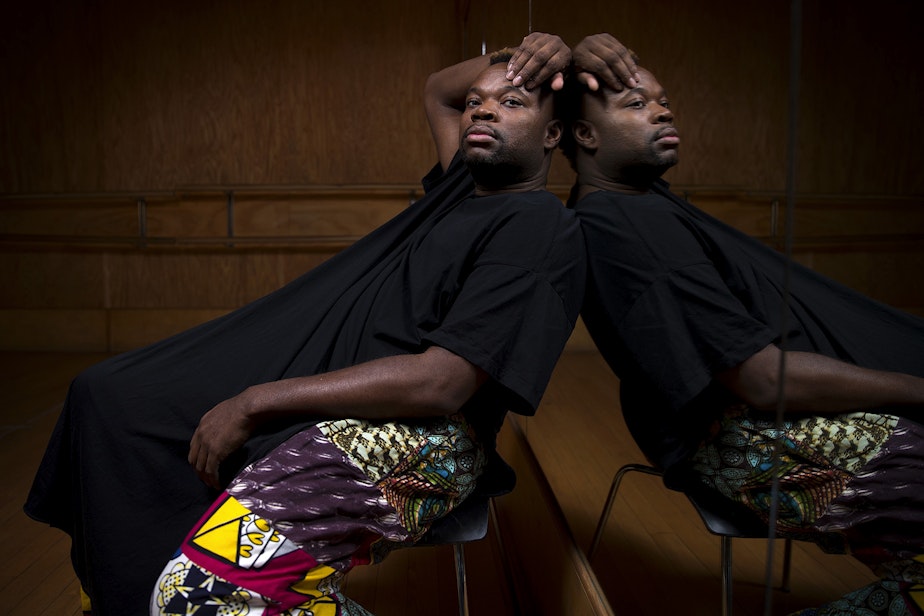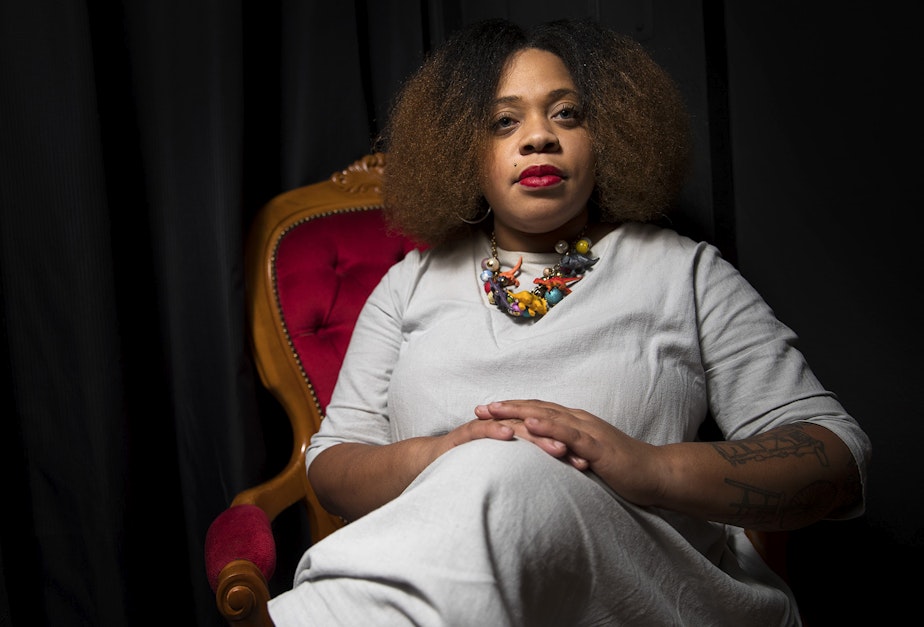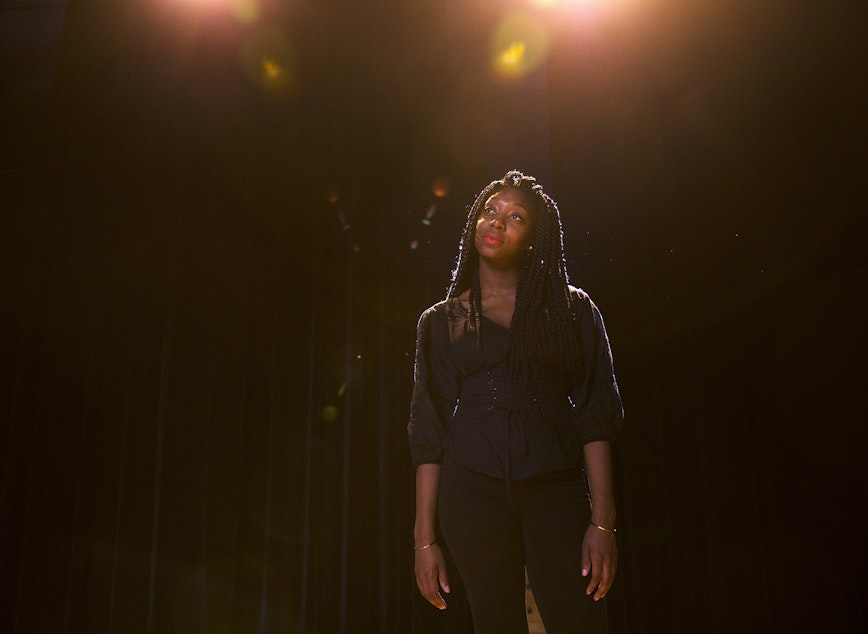Four Seattle artists you should know about (if you don't already)

Seattle has a rich and diverse arts community, but many people believe the city's African American artists don't get the widespread attention they deserve.
We asked you for the names of local artists you're excited about; we received more than 80 names. Here are four of those artists.
Jade Solomon Curtis
Dance gave Jade Solomon Curtis a chance to imagine a different kind of life for herself.
“I grew up in and out of pretty rough neighborhoods,” she says. "My first dance class was an audition. I had on my pink tights and my pink leotard. I was all pinked out."
Curtis had no formal training, but the teachers placed her in intermediate level classes.
"I was like, 'okay, maybe I got something.'"
Now dance helps Curtis grapple with the racism she's experienced throughout her life, in the south where she grew up and in her adopted Northwest home.
“I was called a n****r here in Seattle, on Capitol Hill," she says.
Curtis calls that experience an awakening. It sparked her solo show "Black Like Me."
Curtis moved to Seattle in 2012 to dance with choreographer Donald Byrd’s company, Spectrum. She left after four years to create her own work, inspired by Byrd’s fierce commitment to addressing social concerns through his art.
“To create work, that’s your duty,” says Curtis. “And to not stray away from the reality, what’s happening right now, right here, down the street and around the corner.”
Jade Solomon Curtis hopes to tour "Black Like Me" nationwide.

Dani Tirrell
Dani Tirrell is a dancer and a storyteller, but it took him a while to discover his voice as a choreographer.
Tirrell grew up dancing with his family in Detroit, where he trained formally in jazz and ballet. But he spent most of his early career teaching. After moving to Seattle in 2008, Tirrell found work as an instructor at Northwest Tap Connection. The range of contemporary dance he saw in his new home inspired him to created his own work influenced by his experiences — as well as by social and political issues.
“Every piece I’ve created talks about my queer black body, and black women,” Tirrell says. “As long as black folks are suffering, as long as children are suffering, as long as our elders are suffering, I still have something to say.”
Living in Seattle, Tirrell’s audiences are predominantly white. He says he’s not making his work for them, but hopes they’ll approach what he has to say with an open mind.
“I’m not going to get it right all of the time,” Tirrell says. “I’m just trying to do better like everybody else."
Dani Tirrell's evening length performance "Black Bois" premiers April 26-28 at Seattle's On The Boards.

Elisheba Johnson
Elisheba Johnson has done a lot in 30-something years.
Earned an art degree from Cornish. Founded and ran the beloved Faire Gallery and Café. Published two acclaimed young adult novels. Created a group called "Collect" that encourages new audiences to buy art. And she works in public arts administration at Seattle’s Office of Arts and Culture.
Johnson is also the mother of a five-year-old son.
Her son was the inspiration and namesake for her novels about boy genius Emery Jones, co-written with her father, Macarthur- award-winning author Charles Johnson.
“I was really inspired by having a four-month-old African American boy and wanting some adventure stories for him,” says Johnson. “The majority of kids’ books with children of color are historical.”
Johnson calls art sustenance for survival — and not just for the white elite.
“I believe strongly that everybody should be able to experience the arts,” she says. “I’m always trying to figure out how to get more art in front of more people.”
In February, Elisheba Johnson's artwork will be at Juan Alonso Rodriguez' studio in the Toshiro-Kaplan Building, 306 S. Washington Street.

Porscha Shaw
Porscha Shaw calls herself greedy. She wants to perform in everything from indie films to television series. She's eager to take on a variety of roles, including those traditionally reserved for white women.
That's because there are very few roles for black actors in general; black women in particular.
“It’s all about just wanting to be seen, and not walking into the room assuming I won’t get the role because I’m a little chocolate colored girl,” Shaw says. “Every time I’m cast as a role not written as a black woman, I’m overjoyed. Because when you’re a black woman, you look at stuff and think, ‘oh, that’s not for me.”
Those who know her don’t doubt those roles will come her way. As one Seattle theater artist observed, Porscha Shaw is “magnetic and luminous and freakishly talented.”
Shaw, a Texas native, grew up singing in church and in school. As a teenager, she entered Houston Grand Opera's high school program.
But early in her freshman year in college, a drama professor spotted her acting potential. Shaw's now a third-year MFA student in the University of Washington's highly competitive Professional Actor's Training Program, set to graduate this spring. She chose UW not only for the quality of its acting program, but also because of its director, Valerie Curtis-Newton.
"It was the only program I was auditioning for where the head was a black woman," says Shaw. "She's mind-blowing. She's really the core reason I came."
See Shaw as Ophelia in the UW Drama School's upcoming production of "12 Ophelias," opening February 16th at the Penthouse Theater on the UW campus in Seattle.

